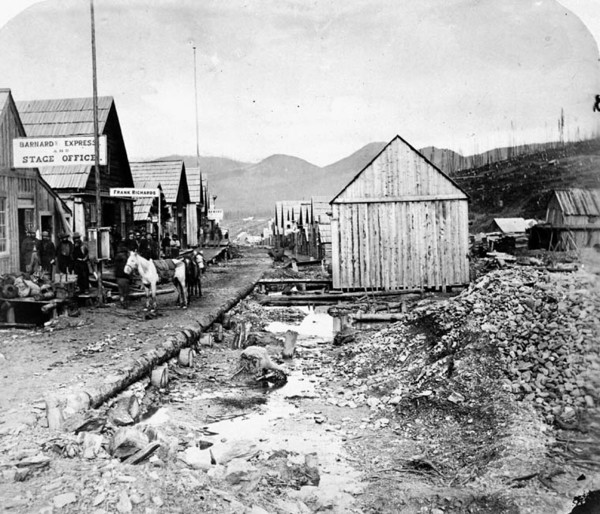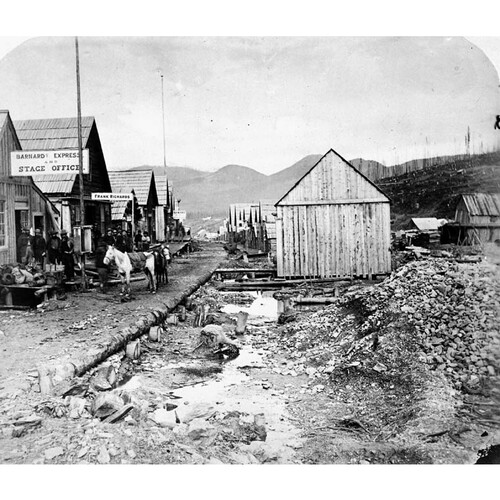
Source: Courtesy of Wikimedia Commons
BENDIXEN, FANNY, saloon-keeper; b. c. 1820 in France; d. 2 May 1899 in Barkerville, B.C.
Almost nothing is known of Fanny Bendixen’s early life. Of French origin, she was apparently drawn to the gold-rush in California, where she married Louis A. Bendixen. Like many Californians, the couple were attracted by the Fraser River gold-rush in British Columbia, and in October of 1862 they opened the St George Hotel on View Street in Victoria, Vancouver Island. Both this venture and the marriage seem to have faltered, however, and Mme Bendixen travelled on her own to the booming gold-mining town of Barkerville in the summer of 1865. She did return to Victoria to winter at the St George, for the Daily British Colonist of 4 Dec. 1865 mentions that both she and her husband were involved in a violent dispute there with another French woman.
In 1866 Mme Bendixen took up permanent residence in the Cariboo and proudly announced the opening of the Parlour, her first saloon in Barkerville. Yet it was short-lived, perhaps because of the bankruptcy proceedings initiated against her husband in Victoria that fall. Louis Bendixen appears to have spent the next few years in Barkerville, but his wife had already established herself as an independent businesswoman. In June 1867 Mme Bendixen opened a second saloon, the Bella Union, which was advertised as being “fitted up in the most elegant style” and serving only the “best brands of liquors and cigars.” Unfortunately, it was completely destroyed in the fire that swept through Barkerville in September 1868, and Mme Bendixen sustained losses estimated at $5,000.
She appears to have had difficulty re-establishing herself in Barkerville after the fire, although she went into partnership with James Burdick in 1869 and is listed as the proprietor of the St George Saloon in Barkerville in 1871. By this time, however, she was already moving her operations to Lightning Creek, where gold had recently been found. Her saloon at Van Winkle was declared to have “one of the finest reading rooms and picture galleries on the creek,” and Mme Bendixen was a popular hostess even though she was not fluent in English. In 1874 she sold this saloon and opened another called the Exchange in the town of Stanley. By the late 1870s the heyday of the Cariboo gold-rush had passed, and Mme Bendixen returned to Barkerville, the one viable town left in the region. There she continued to run a saloon well into the 1890s and was the only woman to be regularly listed in the business directory for that community. On his last visit to the Cariboo in 1889, judge Sir Matthew Baillie Begbie found Mme Bendixen “in great form; indeed enormous, . . . though she was always of goodly diameter.”
Mme Bendixen had been widowed by 1881. Before her death in 1899 she bequeathed her business interests, namely her saloon and two lots in Barkerville, to Hugh Cochrane, the town’s notary public, who had married her grandniece Leonie Fanny. A codicil which Cochrane persuaded Mme Bendixen to attach to the will was, however, disputed after her death. In her original will she had specifically left her ear-rings to Mrs Andrew Kelly, the wife of a well-known hotel-keeper in Barkerville, but a few months before her death, when almost comatose, the dying woman had been assisted in signing the codicil which left them to her grandniece. Mrs Kelly prevented the will from being probated until a court decided that the codicil violated Mme Bendixen’s true intent and that she had not been competent to sign it. Mrs Kelly thus inherited the prized ear-rings, a symbol of her friend Fanny Bendixen’s success as a saloon-keeper during the gold-rush era in British Columbia.
PABC, GR 1052, box 3, no.445. Ashcroft Journal (Ashcroft, B.C.), 29 July, 5 Aug. 1899. Cariboo Sentinel (Barkerville, B.C.), 1865–74. Daily British Colonist (Victoria), 23 Oct. 1862, 4 Dec. 1865. Victoria directory, 1871: 53, 71. Richard Wright, Discover Barkerville (Vancouver, 1984). T. W. Paterson, “British Columbia characters,” Canada West Magazine (Langley, B.C.), 7 (1977), no.1: 37.
Cite This Article
Sylvia Van Kirk, “BENDIXEN, FANNY,” in Dictionary of Canadian Biography, vol. 12, University of Toronto/Université Laval, 2003–, accessed December 31, 2025, https://www.biographi.ca/en/bio/bendixen_fanny_12E.html.
The citation above shows the format for footnotes and endnotes according to the Chicago manual of style (16th edition). Information to be used in other citation formats:
| Permalink: | https://www.biographi.ca/en/bio/bendixen_fanny_12E.html |
| Author of Article: | Sylvia Van Kirk |
| Title of Article: | BENDIXEN, FANNY |
| Publication Name: | Dictionary of Canadian Biography, vol. 12 |
| Publisher: | University of Toronto/Université Laval |
| Year of publication: | 1990 |
| Year of revision: | 1990 |
| Access Date: | December 31, 2025 |



